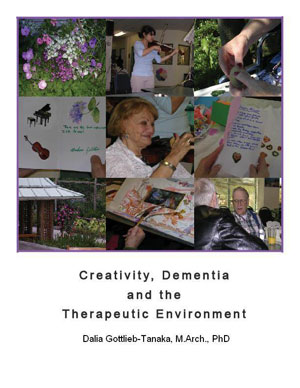Dementia - Activities
Online Resources for Older Adults and Seniors Living with Dementia
Product Details
Creativity, Dementia and the Therapeutic Environment
Dalia Gottlieb-Tanaka, PhD, Chair of the Society for the Arts in Dementia Care, Vancouver, British Columbia.ITEM 10 (CAN $39.95)

- Description
- Content
- Specifications
- Dalia's Bio
- Preview
- Review
This book is based on Gottlieb-Tanaka's dissertation and aims to explore the physical environment and the level of success of creative expression programs for seniors with mild cognitive impairment to moderate dementia. It focuses on the circumstances that enhance or limit the seniors' ability to express themselves creatively. Understanding the physical, cognitive and social abilities of this population helps define the strategies for designing the shape and form of the physical environment.
With appropriate architectural planning and design, such environments have the potential to attract seniors with dementia to stay in the space and become engaged in creative expression activities. But the space alone is not enough to engage the seniors. Success in implementing a creative expression program is linked strongly with an understanding of the seniors’ physical and cognitive abilities and with the commitment of the facilitator to adopt a flexible approach to each individual.
This book is based on qualitative research conducted with seniors at two adult day care centres. It will be of interest to health professionals, architects and designers, care providers, administrators of care facilities and families of people with dementia.
Table of Contents
CHAPTER I: INTRODUCTION
Thesis Organization
Overview of the Research Problem
Research Questions
Objectives
CHAPTER II: LITERATURE REVIEW
The Therapeutic Environment
Current Arts-Based Programs
New Directions for Research and Implications for Practical Implementation
Recommendations
Emerging Approaches to Creativity Research
Other Perspectives on Creativity and Expression
The Meaning of Creativity, Gaps in Information
How Seniors with Dementia Experience Everyday Creativity within the Aging Process
CHAPTER III: METHODS
Qualitative Research
Ethics in Research
CHAPTER IV: UNDERSTANDINGS DERIVED THROUGH INQUIRY
Themes That Emerged from the Literature Review
Design Principles for a Therapeutic Environment
Physical Changes to the Environment and the Users' Response to Them
Summary of Understandings Based on the Inquiry
CHAPTER V: DISCUSSION
Reviewing the Themes
Reviewing the Design Principles
Reviewing the Understandings Reached
Questions for Future Inquiry and Closing Comments
The Overall Significance of the Thesis
Epilogue
Bibliography
- Format: PDF - 220 Pages
- Send via Email
Dalia Gottlieb-Tanaka earned her PhD from the University of British Columbia (UBC) in 2006 in the Institute of Health Promotion Research and the Interdisciplinary Studies Program. In 2011 she completed a Post Doctorate Fellowship with the Department of Psychology at UBC. In 1976 she graduated from the Bezalel Academy of Arts & Design in Jerusalem, and in 1980 received a Master's of Architecture degree from UBC. After working in architecture for about 30 years and raising a family, Dalia returned to school to pursue a new direction in gerontology, specifically in the study of creative expression, dementia and the therapeutic environment.
The Creative Expression Activities Program she conceived and developed for seniors with dementia won an award from the American Society on Aging and the MetLife Foundation. She continues to deliver presentations and workshops demonstrating the program and her research work in the US, Canada, Israel and Europe. Dalia founded the Society for the Arts in Dementia Care in British Columbia and is the moving force behind the annual international conferences and workshops on creative expression, communication and dementia (CECD). In 2013, she established the At This Age group in Vernon, BC for seniors of healthy cognition in an effort to delay symptoms of dementia through engagements in the creative arts. For more info: www.cecd-society.org
“This research makes new and important contributions to the diverse fields of expressive arts therapy, psychology of the aging, and universal architectural design. It is an ambitious multi-disciplinary work that pioneers new areas in need of further study and research.
The dissertations’ outstanding feature is its focus on how the design of the physical space supports and hinders therapeutic, creative, and general quality of life outcomes. The overall content and presentation of pages 115 through 171, the core of the truly original research, is especially impressive. The summaries of principles and discoveries according to artistic modalities and more general design concepts offer important guides to expressive arts therapists and professionals from every discipline working with aging people. The visual/graphic quality of the presentation is engaging and notable. There is a tremendous need in all areas of education, health and human service to understand more about how spatial and architectural features of environments influence human communication, relationships and well-being. The lack of attention that has been given to this important domain no doubt results from the scarcity of researchers with the ability to combine the fields of architecture, interior design, expressive arts therapy, and psychology. Dalia Gottlieb-Tanaka has the relatively unique ability and vision required to pursue this line of integrative inquiry and ultimately achieve credible and useful outcomes.”
Shaun McNiff
University Professor
Lesley University
Cambridge, MA